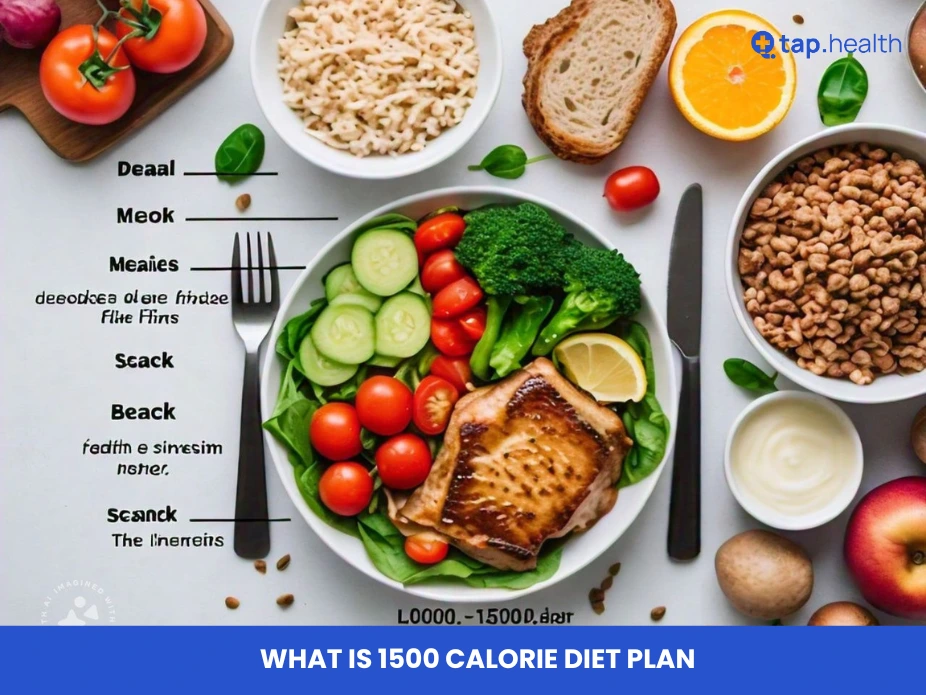A 1500-calorie diet plan is a structured approach to eating that is designed to help individuals lose weight by creating a calorie deficit while still providing enough nutrients to keep the body functioning properly. It’s a popular choice for people who want to lose weight at a moderate and sustainable pace, without feeling too deprived or sacrificing nutrition.
In this blog post, we’ll take a deep dive into what a 1500-calorie diet plan is, how it works, the potential benefits, and how to create balanced meals while following the plan. Additionally, we will explore real-life scenarios, expert contributions, and recommendations grounded in proven research and facts.
Understanding the 1500 Calorie Diet Plan
A 1500 calorie diet plan is exactly what it sounds like—an eating plan that limits your daily calorie intake to 1500 calories. For many people, this is a moderate calorie restriction, especially for those aiming to lose weight. It is often recommended by dietitians for individuals who are looking to lose weight at a gradual and sustainable rate.
The basic principle of any weight loss plan is creating a calorie deficit, which occurs when the number of calories you burn exceeds the number of calories you consume. If you consume fewer calories than your body needs for energy, your body will start to use stored fat as fuel, leading to weight loss.
A 1500-calorie diet works by providing a reasonable balance of proteins, fats, and carbohydrates, ensuring that you get the necessary nutrients while also reducing overall calorie intake.
How Does a 1500 Calorie Diet Help with Weight Loss?
To understand how a 1500-calorie diet helps with weight loss, let’s look at a few key points:
- Calorie Deficit: The average daily calorie needs for an adult woman range between 1,800 to 2,400 calories and for men, between 2,200 to 3,000 calories depending on age, activity level, and other factors. By consuming only 1500 calories per day, you create a calorie deficit, which can lead to weight loss over time. For instance, if your maintenance calories are 2,000 per day, eating 1,500 calories can result in a 500-calorie deficit per day, potentially leading to a weight loss of about 0.5 kg per week.
- Nutrient Density: With a 1500-calorie diet, you’ll need to make smart choices about what you eat to ensure you’re getting enough essential nutrients like vitamins, minerals, fiber, and protein. Foods like lean meats, whole grains, vegetables, and fruits should be your focus.
- Sustainability: A 1500-calorie diet is sustainable for most individuals because it is not too extreme. It allows for a wide variety of food choices, making it easier to stick to in the long term, compared to restrictive diets like those that limit carbohydrates or fats drastically.
Benefits of a 1500 Calorie Diet
1. Promotes Steady Weight Loss
A 1500-calorie diet helps you shed pounds in a healthy and controlled manner. When combined with regular physical activity, this diet can result in consistent weight loss without feeling overly hungry or deprived.
2. Improves Health Markers
In addition to weight loss, a 1500-calorie diet may help improve important health markers like cholesterol levels, blood pressure, and blood sugar regulation. Reducing calorie intake can help lower the risk of chronic diseases such as diabetes and heart disease.
3. Boosts Energy Levels
Even though you are cutting back on calories, focusing on nutrient-dense foods ensures you’ll have enough fuel to power your day. Foods rich in protein, healthy fats, and complex carbohydrates provide longer-lasting energy compared to processed foods that cause energy crashes.
4. Supports Long-Term Habit Formation
The 1500-calorie diet isn’t about deprivation; it’s about making healthier choices and developing sustainable habits that you can follow for the long haul. Unlike fad diets, which often result in quick weight loss followed by rapid weight regain, the 1500-calorie diet encourages lasting, maintainable results.
How to Structure a 1500 Calorie Diet Plan
When following a 1500-calorie diet, it’s essential to focus on eating balanced meals that include healthy fats, lean proteins, and complex carbohydrates. Here’s how you can structure your daily meals:
Sample Daily Breakdown
- Breakfast (300 calories):
- 2 scrambled eggs with spinach and a small piece of whole-grain toast.
- 1 cup of coffee with almond milk or black tea.
- Snack (150 calories):
- A small handful of almonds (about 12-15 nuts).
- Lunch (400 calories):
- Grilled chicken breast with a large mixed salad (lettuce, cucumber, cherry tomatoes, olive oil, and balsamic vinegar dressing).
- A small serving of quinoa or brown rice.
- Snack (150 calories):
- 1 medium apple and a tablespoon of peanut butter (natural, no added sugar).
- Dinner (500 calories):
- Baked salmon fillet with roasted vegetables (broccoli, bell peppers, zucchini) and a small serving of sweet potato.
Tips for Meal Planning:
- Protein-Rich Foods: Include sources of lean protein like chicken, turkey, fish, tofu, legumes, and eggs. Protein helps with muscle maintenance, satiety, and supports metabolic function.
- Healthy Fats: Include healthy fats in your diet from sources like avocado, olive oil, nuts, and seeds. These fats help promote satiety, reduce inflammation, and are essential for overall health.
- Complex Carbs: Whole grains like quinoa, oats, and brown rice provide fiber and energy to help keep you full and satisfied.
- Fiber-Rich Vegetables: Vegetables like leafy greens, bell peppers, broccoli, and carrots provide essential vitamins, minerals, and fiber while being low in calories. Aim for 4-5 servings of vegetables daily.
Real-Life Scenarios: Success Stories with the 1500 Calorie Diet Plan
Scenario 1: Sarah’s Steady Weight Loss Journey
Sarah, a 35-year-old working mother, was struggling to lose the 15 kgs she had gained after pregnancy. She decided to start a 1500-calorie diet plan with the help of a nutritionist. She replaced processed snacks with whole foods like fruits, vegetables, lean protein, and healthy fats.
Result: After three months, Sarah had successfully lost 10 kgs and felt more energetic. Her doctor was also impressed with the improvement in her cholesterol levels and blood sugar levels. By focusing on portion control and making smarter food choices, Sarah was able to create lasting habits that worked for her.
Scenario 2: John’s Fitness Transformation
John, a 40-year-old man with a busy job, had put on weight over the years and wanted to lose 20 kgs. He followed the 1500-calorie diet, pairing it with strength training and cardio workouts 4 times a week. His meals were packed with protein and fiber to help keep him full during the workday.
Result: John lost 18 kgs in six months and significantly improved his overall fitness level. He continued to follow the 1500-calorie plan while maintaining a healthy exercise routine, allowing him to sustain his weight loss in the long term.
Expert Contributions: Insights into the 1500 Calorie Diet Plan
Dr. Rachael V. Heller – Nutrition Expert
Dr. Heller, a nutritionist and author of The Skinny Rules, emphasizes the importance of a balanced diet when following a calorie-restricted plan like the 1500-calorie diet. According to her, including lean proteins, healthy fats, and fiber-rich vegetables is crucial for long-term weight loss success. She also stresses the importance of portion control and avoiding processed foods that are high in empty calories.
Dr. Michael Mosley – Intermittent Fasting Advocate
Dr. Mosley, known for his work on intermittent fasting, suggests combining intermittent fasting with a 1500-calorie diet to accelerate weight loss. His research shows that fasting can enhance fat burning while keeping the metabolism functioning at a high rate. If you want to combine intermittent fasting with a 1500-calorie diet, you can try methods like the 16:8 fasting approach, where you fast for 16 hours and eat within an 8-hour window.
Recommendations Grounded in Proven Research
Research from the National Institutes of Health (NIH) and the American Heart Association (AHA) shows that gradual weight loss, achieved through a calorie-restricted diet and increased physical activity, is the most effective and sustainable approach. A study published in the Journal of Obesity demonstrated that individuals who followed a calorie-controlled diet, along with exercise, were more likely to achieve long-term weight loss and maintain it.
FAQs: Everything You Need to Know About the 1500 Calorie Diet
1. Is the 1500-calorie diet safe?
For most people, a 1500-calorie diet is safe, but it’s always best to consult with a healthcare professional before starting any new diet. It’s important to ensure you’re getting the right nutrients and not depriving your body of essential vitamins and minerals.
2. Can I exercise while on a 1500-calorie diet?
Yes, you can exercise while on a 1500-calorie diet. In fact, combining exercise with a calorie-controlled diet is one of the best ways to achieve weight loss. However, make sure you’re eating nutrient-dense foods to fuel your workouts.
3. Will I be hungry on a 1500-calorie diet?
Hunger can be managed by eating foods that are high in fiber and protein, which help keep you full. Drinking water regularly and eating nutrient-dense snacks can also help curb hunger between meals.
4. How long should I follow a 1500-calorie diet?
You can follow a 1500-calorie diet for as long as it is helping you achieve your weight loss goals. However, it’s essential to reassess periodically to make sure it’s still working for you and that you’re getting all the necessary nutrients.
Conclusion
The 1500-calorie diet plan is a balanced approach to weight loss that works by creating a calorie deficit while still providing the necessary nutrients your body needs. By making smart food choices and combining the diet with regular exercise, you can achieve sustainable weight loss over time. Always remember to consult with a healthcare provider before starting any new diet to ensure it’s safe and suitable for you.
For more information on healthy weight loss, check out Healthline and Mayo Clinic.




